Research - (2021) Volume 9, Issue 4
Incidence of Multinodular Goitre with Auto Immune Disease in Balaji Medical College and Hospital
*Correspondence: Ravishankar KS, Department of General Surgery, Sree Balaji Medical College & Hospital Affiliated to Bharath Institute of Higher Education and Research, India, Email:
Abstract
Introduction: Multinodular goitre (MNG) is one of the common disorders caused by the thyroid malfunction and require the continuous and effective management. The present study is an attempt to establish the incidence, analyses the symptomatology, modes of treatment and results in patients admitted with a diagnosis of multinodular goitre autoimmune disease in Sree Balaji Medical College and Hospital.
Methods: The patients were enrolled in the study after getting the ethical approval. The test for circulating thyroids, Hypothalamic status, rate of dysfunction, Fine Needle Aspiration Cytology were done.The demograghic data were collected and the results were statistically analysed.
Results: The Hasimoto’s thyroiditis of MNG was found most (30%) in post-operative patients and 30% of them were diagnosed. The present study also revealed the role of hyperthyroidism in MNG patients and positive association of multinodular goitre with auto immune disease. The patients showed altered profile of apo 1 and 2 on having hasimoto’s and riedels thyroidism.
Conclusion: The present study revealed the need of systematic evaluation for diagnosing the MNG.
Keywords
Multinodular goiter, Circulating thyroids, Hypothalamic status, Fine Needle Aspiration cytology, Autoimmune disease
Introduction
Multinodular goitre (MNG) is one of the common disorders caused by the thyroid malfunction. MNG is frequently caused by the genetic heterogeneity of follicular cells that changed from normal ones and acquire the ability to behave improper signaling to form the inheritable lineages. The nodular goiter is often detected simply as a mass in the neck and enlarged in time course to produce pressure symptoms. The surplus presence of iodine results in growth of MNG and hyperthyroidism. Multi nodular goiter with auto immune disease is a frequently encountered problem after the surgery. Diagnosis is based on the physical examination due to lack of awareness; the people only understand the problem after the maturity of the nodules. Though, few usually approach the local physicians, but fail in getting the proper treatment courses. Besides, the physicians also have not adequately trained to treat the goiters and there is a systematic gap in the diagnosis and treatment. Controversy, however, does exist as to the best method to treat multinodular goiters with auto-immune disease adequately, especially in patients with toxic symptoms. Thus, there is a high degree of association between multinodular goitre with auto immune disease and hypothyroidism. Antithyroid peroxidase was positive in all patients with hasimoto’s disease. So, it may be a reliable investigation to confirm hasimoto’s. Similarly, anti-thyroglobulin test was positive in all patients with Riedel’s thyroiditis. It is not a reliable investigation to confirm riedels thyroiditis. Both Anti thyroid peroxidase and Antithyroglobulin was negative in all the patients with multinodular goiter without autoimmune disease. The present study is an attempt to establish the incidence, analyses the symptomatology, modes of treatment and results in patients admitted with a diagnosis of multinodular goitre autoimmune disease in Sree Balaji Medical College and Hospital [1-15].
Study Design and Methods
After obtaining the ethical approval, 30 subjects were included in the study based on inclusion and exclusion criteria as follows.
Inclusion criteria
Age between 20 to 60.
Consenting subjects.
Associated thyroid disease.
Associated autoimmune disease.
Exclusion criteria
Age <20, >60.
Graves’ disease
The selected patients fulfilling the inclusion criteria were tested for their thyroid malfunction using the following two basic criteria (a battery of tests based on diagnosis methods).
Tests of Circulating thyroid hormone levels
The patients undergone for the following tests, Serum. Free Thvroxine (T4), Serum Triiodothyronine (T3), Free Thyroxine, Free triiodothyronine.
Tests of Hypothalamic
Pituitary function 1. Thyroid -Stimulating Hormone, Thyrotrophin - Releasing Hormone Test, Dynamic Tests of Thyroid Function 1, Radioiodine Isotope Uptake.
Tests of thyroid dysfunctions
Thyroid Antibodies, Anti-Tpo Antibodies, Ultrasound Based Methods sound waves.
Fine needle aspiration cytology
This technique promoted by the Karolinska Institute has only recently gained wider acceptance. A 25-gauge disposable needle on a 10 ml syringe enables cells to be aspirated from any suspicious areas of the thyroid. The procedure can be performed quickly and painlessly in the outpatient department without the need for a local anaesthetic, providing a smeared specimen which can be fixed and stained on a microsurgery shade. A high level of diagnostic accuracy can be achieved when the clinician and cytologist are experienced.The technique cannot distinguish benign from malignant follicular lesions since no information is available about capsular or vascular invasion [1-32].
Results
The present study aimed to analyses the prevalence and suitable treatment for Multinodular Goitre developing after surgery. Approximately, 30% of the patients were diagnosed with the presence of the Muitinodular Goitre and the females (93.33%) were more prone for the disease than the male (6. 66%), of them, 93.3% were diagnosed with hasimoto's thyroiditis and very few with riedels thyroiditis (Figure 1).
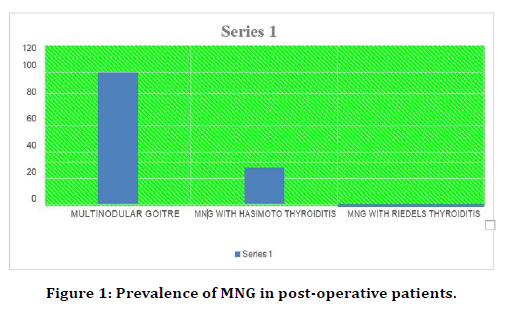
Figure 1. Prevalence of MNG in post-operative patients.
The fine needle aspiration cytology study revealed that confirmation of multi nodular goitre in 70% of the patients (Figure. 2) followed by hasimoto's thyroiditis (28%) and riedels thyroiditis (2%).
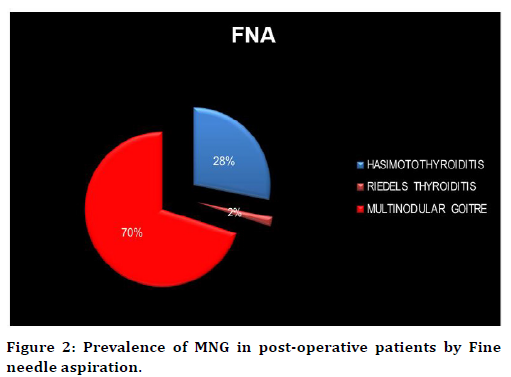
Figure 2. Prevalence of MNG in post-operative patients by Fine needle aspiration.
In the present study, the post-operative patients were undergone for thyroid profile analysis. The study revealed that thyroid level was disturbed and 39% of them showed hypothyroidism. 11% were diagnosed with hyper state and 50% were had euthyroid status. This study showed the important of frequent analysis of thyroid profile on post-operative patients. (Figure 3).
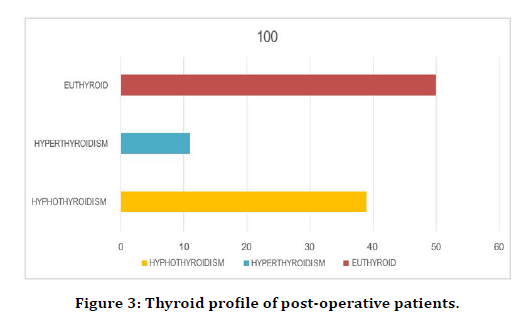
Figure 3. Thyroid profile of post-operative patients.
The study further analyzed the status of MNG in patients (Figure 4). Approximately, 86% of hypothyroidism patients had MNG and its prevalence was least in hyperthyroidism (14%).
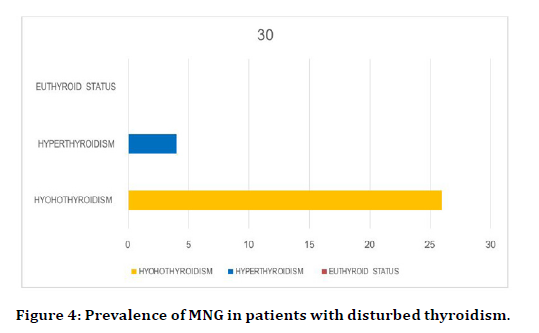
Figure 4. Prevalence of MNG in patients with disturbed thyroidism.
The destruction of thyroid cells in during thyroid disorders could be revealed by analyzing the anti-thyroid peroxidase. In the present study, 28% of patients (hasimoto’s disease) revealed the presence of anti-thyroid antibodies. 2% of them had anti tpo2 and the same ratio was found the patients having riedels thyroiditis. Only, 8% of riedels thyroiditis patients had apo1 (Figure. 5). All of them were diagnosed with MNG.
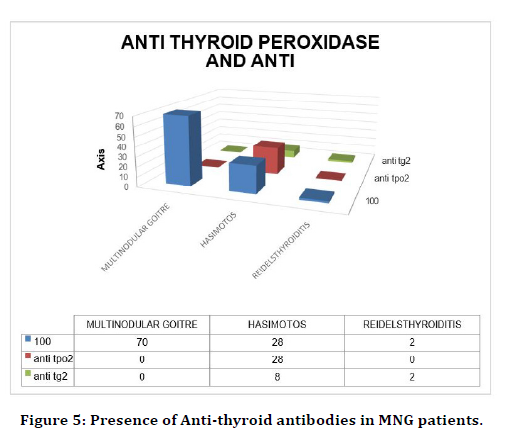
Figure 5. Presence of Anti-thyroid antibodies in MNG patients.
Discussion
The present study aimed to analyses the feasible method for detecting the MNG based on the thyroid profiles such as Ft3, Ft4, TSH, Anti thyroid peroxides, anti-thyroglobulin and FNAC. FNAC is the prominent method for detecting the goitre status. According to the fine needle aspiration cytology results, out of 100 patients was multi nodular goiter, 28 patients (28%) were found to have hashimoto’s disease. Our results are concordant with the previous study [33]. In the present study, two patients were found to have riedels thyroiditis and the remaining 70 patients were multinodular goitre without auto immune disease. The previous study also showed that the occurrence of MNG without the immune disease in presence of iedels thyroiditis [34]. The thyroid disturbance is frequently found in mNG patients and our results also revealed that the altered thyroid status among the patients.
Anti-thyroid peroxidase (anti tpo2) and Anti thyroglobulin (antitg2) was done in all the too particular r. Anti-thyroid peroxidase was found to be positive in all 28 patients with hasimoto’s disease, while it was negative in both the particular with riedels thyroiditis and all 70 patients with multinodular goitre without auto immune disease. This result was like the previous study by Mehanathan et al. [35]. Antithyroglobulin test was positive in both the patients with riedels thyroiditis. while it was positive in 8 patients out of 28 patients with hasimoto’s disease and it was NEGATIVE in all patients with MNG without auto immune disease. In the previous study, Zelmanovitz et al. [36] had showed similar thyroid profile in the studied patients.
Conclusion
MNG was found frequently in post-operative patients and 30% of them were diagnosed hasimoto’s thyroiditis. The present study also revealed the role of hyperthyroidism in MNG patients and the existence of high degree of association between multinodular goitre with auto immune disease and hypothyroidism. The patients showed altered profile of apo 1 and 2 on having hasimoto’s and riedels thyroidism.The present study revealed the need of systematic evaluation for diagnosing the MNG. 100 cases of MNG were studied of which 30% cases was found to have auto immune disease, which constitute 30% of cases. Among this 30% of cases predominance was hasimoto’s thyroiditis (93%) and riedel’s thyroiditis with (7%). In our study, the patients with multinodular goitre are more susceptible to hypothyroidism. Also, in patients with MNG with auto immune disease most of the patients are with hypothyroidism.
Funding
No funding sources.
Ethical Approval
The study was approved by the institutional ethics committee.
Conflict of Interest
The authors declare no conflict of interest.
Acknowledgments
The encouragement and support from Bharath University, Chennai is gratefully acknowledged. For provided the laboratory facilities to carry out the research work.
References
- Gayathri BN, Kalyani R, Harendra KM, et al. Fine needle aspiration cytology of Hashimoto's thyroiditis–A diagnostic pitfall with review of literature. J Cytology 2011; 28:210.
- Bhatia A, Rajwanshi A, Dash RJ, et al. Lymphocytic thyroiditis–is cytological grading significant? A correlation of grades with clinical, biochemical, ltrasonographic and radionuclide parameters. Cyto J 2007; 4:10.
- Owen SG, Smart GA, Hall R. The relation of thyroid auto-immunity to round-celled infiltration of the thyroid gland. J Clin Pathol 1960; 13:499-501.
- Cibas ES. Thyroid in cytology: Diagnostic principles and clinical correlates. 3rd Edn Saunders, an imprint of Elsevier, Philadelphia, Pa USA, 2009; 264–265.
- Dumlu G, Kiyak G, Bozkurt B, et al. Correlation of thyroid fine-needle aspiration with final histopathology: a case series. Minerva Chirurgica 2013; 68:191-197.
- Pearce EN, Farwell AP, Braverman LE. Thyroiditis. New England J Med 2003; 348:2646– 2655.
- Yasuji I. Subacute thyroiditis in a patient with juvenile idiopathic arthritis undergoing etanercept treatment: A case report and review of the literature. Modern Rheumatol 2013; 23:397–400.
- Nyulassy S, Hnilica P, Buc M. Subacute (de Quervain’s) thyroiditis: Association with HLA Bw35 antigen and abnormalities of the complement system, immunoglobulins and other serum proteins. J Clin Endocrinol Metabolism 1977; 45:270–274.
- Samuels MH. Subacute, silent, and postpartum thyroiditis. Med Clin North Am 2012; 96:223–233.
- Fatourechi V, Aniszewski JP, Fatourechi GZE, et al. Clinical features and outcome of subacute thyroiditis in an incidence cohort: Olmsted County, Minnesota study. J Clin Endocrinol Metabolism 2003; 88:2100–2105.
- Cappelli C, Pirola I, Gandossi E, et al. Ultrasound findings of subacute thyroiditis: A single institution retrospective review. Acta Radiol 2013; 55:429-433.
- https://journals.lww.com/annalsofsurgery/fulltext/2012/10000/Fischer_s_Mastery_of_Surgery,_Sixth_Edition.15.aspx
- https://academic.oup.com/ajcp/article/106/3/434/1757260
- Brent GA. Molecular basis of thyroid hormone action. N Engl J Med 1994.
- Burrow GN. Thyroid hormone biosynthesis. Thyroid Function Dis 1990.
- Franklyn JA. Thyroid hormone action. Diseases Thyroid Pathophysiology and Management 1994.
- John R, Lazarus J.H. Hormone measurements disease of the thyroid. Pathophysiology and Management 1994.
- Patwardhan NA, Moront N. Surgery still has a role in hyperthyroidism. Surgery,1993.
- Cooper DS. Thyroxine therapy for benign nodular disease. J Clin Endoc Metab 1995.
- Gharib H, Goellner Goellner JR, Johnson DA. Fine needle aspiration biopsy of thyroid. A 12 years’ experience with 11,00 biopsies. Clin Lab Med 1993; 13:699-709.
- Gharib H, Goellner JR. Fine-needle aspiration biopsy of the thyroid: An appraisal. Annals Inter Med 1993; 118:282-289.
- Clark OH. Surgical anatomy. The Thyroid: A fundamental and clinical text. 6th Edn 1991.
- Jatzko GR, Lisborg PH, Müller MG, et al. Recurrent nerve palsy after thyroid operations--principal nerve identification and a literature review. Surgery 1994; 115:139-144.
- Lekaws NL, Tjardis PJ. Course of recurrent laryngeal nerve relative to inferior thyroid artery and the suspensory lig of berry. Int Surg 1992.
- Hall R, Besser M. Fundamentals of clinical endocrinology. 4th Edn. 1989.
- Hedley AJ, Michie W, Duncan T, et al. The effect of remnant size on the outcome of subtotal thyroidectomy for thyrotoxicosis. Br J Surg 1972; 59:559-563.
- Kaplan EZ. Surgery of thyroid and parathyroid glands. Clinical Surg Int 1983; 6.
- Kank H.E. et al. Voice changes after thyroidectomy. The role of External laryngeal nerve Br. J. Med. 1984.
- Wilson, Fosters Edn. William’s textbook of endocrinology. 8th Edn.
- http://course.sdu.edu.cn/G2S/eWebEditor/uploadfile/20130616081941244.pdf
- Sabiston DC, Kim Lyerly H. Textbook of surgery. 15th Edn 1997.
- Johnston TB, Willis J. Gray’s anatomy. 19th Edn. 1946.
- Sengupta A, Pal R, Kar S, et al. Fine needle aspiration cytology as the primary diagnostic tool in thyroid enlargement. J Nat Sci Biol Med 2011; 2:113-118.
- Kraiem Z, Glaser B, Yigla M, et al. Toxic multinodular goiter: a variant of autoimmune hyperthyroidism. J Clin Endocrinol Metab 1987; 65:659-664.
- Mehanathan PB, Erusan RR, Shantaraman K, et al. Antithyroid peroxidase antibodies in multinodular hashimoto's thyroiditis indicate a variant etiology. J Thyroid Res 2019; 4892329.
- Zelmanovitz F, Zelmanovitz T, Beck M, et al. Riedel's thyroiditis associated with high titers of antimicrosomal and antithyroglobulin antibodies and hypothyroidism. J Endocrinol Invest 1994; 17:733-737.
Author Info
Department of General Surgery, Sree Balaji Medical College & Hospital Affiliated to Bharath Institute of Higher Education and Research, Chennai, Tamil Nadu, IndiaCitation: Hari D, Ravishankar KS, Incidence of Multinodular Goitre with Auto Immune Disease in Balaji Medical College and Hospital, J Res Med Dent Sci, 2021, 9 (4): 348-352.
Received: 20-Mar-2021 Accepted: 16-Apr-2021
